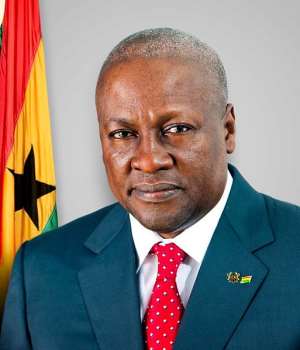
President John Dramani Mahama was forced to turn to the IMF after heaping government debt and falling export revenue which clocked a 28 percent plunge in the Ghanaian currency against the dollar in the past years.
According to Bloomberg-USA, the International Monetary Fund (IMF) team agreed to lend Ghana almost $1 billion to help boost foreign-exchange reserves and bolster Africa's worst-performing currency is not 100 percent sure. The agreement includes a three-year loan program of 660 million Special Drawing Rights, or $933 million, the head of the IMF mission, Joel Toujas-Bernate, said in an interview on Thursday in Accra, the capital. The plan will be presented to the IMF's board for approval in April, with the first payment of about $100 million to be made shortly after.
President John Dramani Mahama was forced to make a "sharp U turn" to the IMF after "blowing big" the balloon of the government debt and the falling export revenue triggered a 31 percent plunge in the currency against the dollar in the past year. The IMF loan terms will require some restrictions on the government, to cut back on spending, especially on civil servants' salaries, which account for almost 70 percent of tax revenue. The program aims at ambitious fiscal consolidation over the stipulated three years, which will be based on expenditure restraint, especially with regard to the wage bill, which has been one of the serious factors behind the large fiscal imbalances registered in the last few years.
Ghana is expected to narrow the fiscal deficit to 6.5 percent of gross domestic product this year, down from an average of about 10 percent in the past three years. The Finance Minister, Seth Terkper stated in his budget speech in November to put a freeze on hiring, boost tax revenue, partly by raising fuel taxes, and improve the management of public funds and debt.
The IMF economic impact of the agreement will depend on the government's ability to tackle its wide fiscal deficit, John Ashbourne, Africa economist at London-based Capital Economics, said in an e-mailed note. Narrowing the shortfall will be politically difficult, and require a deeper degree of fiscal discipline than President John Dramani Mahama's government has shown so far.
The IMF predicted, the government may miss its fiscal deficit target this year because of lower oil-export revenue. The shortfall will probably reach about 7.5 percent of GDP, with a plan to bring that down to between 3.5 percent and 4 percent by 2017 and Public debt is set to fall to below 60 percent of GDP over the program period. IMF wants Ghana government to improve management of the public-sector wage bill, including an audit of the payroll database and security system to ensure that irregularities and ghost workers are eliminated.
The independence of the central bank also needs to be strengthened, the IMF boss, Toujas-Bernate told reporters at a press conference announcing the agreement. The Bank of Ghana must reduce financing of the budget deficit to 5 percent of revenue this year, from 6.6 percent last year.
The target for 2016 is zero percent. The IMF loan, if approved, will have a zero interest rate with repayment over 10 years and the funds will be disbursed to the central bank, which will use it to boost foreign-currency reserves, which stood at $4.9 billion in January. The assistance from IMF will help to draw about $1 billion in additional budgetary aid from international donors over the three years.
Most of Ghana's debt was cleared in 2005 as part of a global relief campaign for poor nations. Since then, Ghana has ramped up borrowing, including selling dollar bonds to tap rising demand from foreign investors searching for high-yielding debt.
The spending volume and constant power shortages in Ghana may restrict its economic growth to about 3.5 percent this year, according to the IMF. The economy may probably expand between 4 percent and 5 percent in 2016.
FRANCIS TAWIAH (Duisburg - Germany)




 There’s nothing you can do for us; just give us electricity to save our collapsi...
There’s nothing you can do for us; just give us electricity to save our collapsi...
 Ghanaian media failing in watchdog duties — Sulemana Braimah
Ghanaian media failing in watchdog duties — Sulemana Braimah
 On any scale, Mahama can't match Bawumia — NPP Youth Organiser
On any scale, Mahama can't match Bawumia — NPP Youth Organiser
 Never tag me as an NPP pastor; I'm 'pained' the 'Akyem Mafia' are still in charg...
Never tag me as an NPP pastor; I'm 'pained' the 'Akyem Mafia' are still in charg...
 Your refusal to dedicate a project to Atta Mills means you never loved him — Kok...
Your refusal to dedicate a project to Atta Mills means you never loved him — Kok...
 2024 elections: I'm competent, not just a dreamer; vote for me — Alan
2024 elections: I'm competent, not just a dreamer; vote for me — Alan
 2024 elections: Forget NPP, NDC; I've the Holy Spirit backing me and nothing wil...
2024 elections: Forget NPP, NDC; I've the Holy Spirit backing me and nothing wil...
 2024 elections: We've no trust in judiciary; we'll ensure ballots are well secur...
2024 elections: We've no trust in judiciary; we'll ensure ballots are well secur...
 Performance tracker: Fire MCEs, DCEs who document Mahama's projects; they're not...
Performance tracker: Fire MCEs, DCEs who document Mahama's projects; they're not...
 Train crash: Railway ministry shares footage of incident
Train crash: Railway ministry shares footage of incident
